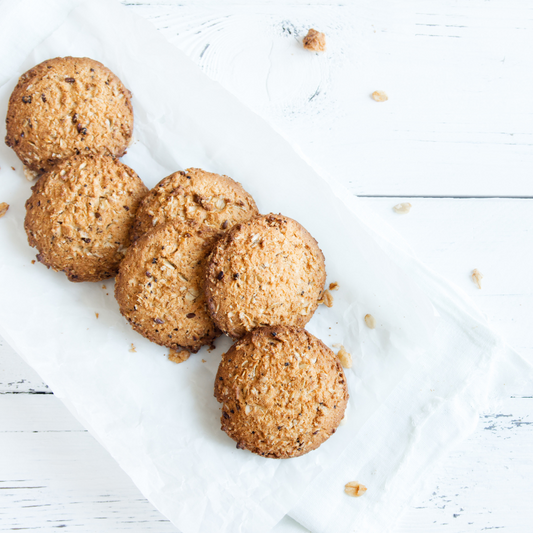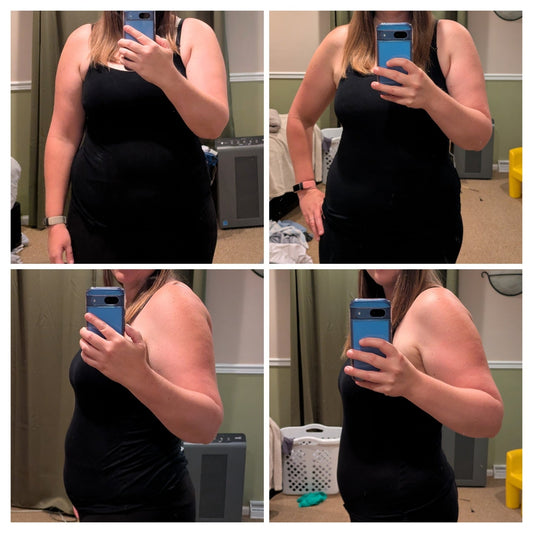As a mom of 4 boys, I know what it feels like to have cravings while pregnant. I especially had pregnancy cravings during the first trimester, when it seemed like I could only survive off of chips and ice cream. My cravings would decrease as I got into the second trimester, but they never really went away. Pregnancy food cravings can mean a lot of different things, and for pregnant women, it is hard to know if your body needs that specific food or not. As a Pre/Post Natal Fitness Specialist and Certified Nutrition Coach, I know how important eating a balanced diet is, and how hard that is with morning sickness, food aversions and intense cravings. I always gained the most weight in the first few months because I had to survive off of chips, bread and salty foods. It is really important to understand why you are experiencing these cravings. Even during pregnancy, cravings are your body's way of signalling that it needs something. There are usually nutritional deficiencies behind common cravings, as as well as hormonal changes driving your love of a particular food. I am going to go over everything pregnancy cravings. Why you get them, what they typically mean, and how you can nourish your body to stop those cravings. Scroll down for my delicious, craving-crushing protein smoothie that always stopped my cravings and gave me so much energy for the whole day!
Should I ignore my pregnancy cravings?
It is best not to ignore your craings, but look deeper into what your cravings may mean. Many times the body is looking for nutrients, so it signals cravings to get you to eat more nutrients. Many times those cravings feel like they are for sweet foods, junk food and even spicy foods. But there is a deeper meaning to these cravings, so you don't want to ignore them, but look into exactly what your body may need. Let's go over some cravings, and what your body is trying to tell you. It is extremely hard to know the exact cause of pregnancy cravings, but we do know that if you aren't eating a lot of nutrient-dense foods, nutrient deficiencies can be a root cause of cravings. I'm going to get tinto some of the most commonly craved food during pregnancy, then go over why you might be craving those foods.
What do sugar cravings mean during pregnancy?
Sweet cravings are one of the most popular cravigns durinre pregnancy. It is really important that you don't ignore these cravings, but also that you don't give into these cravings. Eating excessive sugar can lead to gestational diabetes and excessive weight gain. By getting to the root of craving, you can help your body with what it needs, and reduce the cravings all together, so you can stay health all pregnancy.
Here are the typical reasons you may be craving sugar while pregnant:
- Blood Sugar Fluctuations: When your blood sugar levels drop, you might experience cravings for sugary foods as a quick energy source. This can be especially common if you've consumed a large amount of carbohydrates and your blood sugar subsequently crashes. Pregnancy can cause a lot of blood sugar roller coasters because of all the food aversions, which normally leads to a very high-carbohydrate diet.
- Dopamine Release: Sugary foods can trigger the release of dopamine in the brain, which is associated with pleasure and reward. This can create a cycle of seeking out sugary foods for the positive feelings they induce, which is particularly strong during pregnancy because of the fatigue and nausea. Many women start using sugar to find relief from the pains and exhaustion that can come with pregnancy.
- Gut Microbiota: Emerging research suggests a connection between the types of bacteria in your gut and your food cravings. Some studies have shown that an imbalance in gut microbiota might lead to cravings for certain types of foods, including sugary ones. During pregnancy, the hormone changes can affect the gut bacteria, which is an underlying cause to many cravings.
- Hormonal Changes: Hormones such as insulin, leptin, and ghrelin play roles in hunger and appetite regulation. Fluctuations in these hormones, such as after a meal or during different trimesters of pregnancy.
- Magnesium and Chromium: Deficiencies in certain minerals, such as magnesium and chromium, have been associated with increased sugar cravings. Addressing these deficiencies through a balanced diet might help reduce cravings. I created my Bump Dust Prenatal Protein that covers these nutrients as well as others to help reduce cravings during pregnancy.
- Protein: Inadequate protein intake can sometimes lead to cravings for sugary foods. Including enough protein in your diet can help you feel more satisfied and reduce cravings. Protein is a key player in cravings. Many times your body needs protein, but the cravings come out as sugar. This is why I LOVED my Bump Dust prenatal protein powder all through pregnancy. It tastes sweet, so you feel like you getting something that tastes amazing, but you are getting protein along with amazing superfoods and nutrients.
As you can see, getting your nutritional needs met as a pregnant woman is so important! Specific cravings for things like peanut butter, sour foods or dark chocolate really mean a lot more than just the craving itself! If you have strong urges for sweet foods (most common pregnancy cravings!), you need to look at your nutrition, and try a supplement like Bump Dust that is formulated ot help reduce cravings and nourish your body.
Why am I craving salt during pregnancy?
Salt cravings, similar to sugar cravings, can stem from various physiological and psychological factors. I found that I craved more salty foods in the first trimester, and then the sweet foods in the third trimester, which shows that as hormone levels change, so do your cravings. In the first trimester, I was obsessed with fast food at Starbucks. I would get the spinach feta wrap almost every morning, which isn't particularly unhealthy, and better than french fries or potato chips (which I ended up eating all day anyways!), but it was the salty satisfaction that I had the strong cravings for. Here's what can be going on when you are craving those salty foods.
Here are some underlying reasons you may be craving salt during pregnancy:
Electrolyte Imbalance/Dehydration: When you're dehydrated, your body might interpret this as a need for salt. Drinking fluids is essential, but if your body's electrolyte balance is disrupted due to excessive fluid loss (e.g., sweating), you might experience cravings for salty foods. This can happen if you are working out and sweating a lot during pregnancy (which isn't bad at all!), or maybe you live in a hot environment where you are sweating a lot daily. Also just the changes in hormones can affect the electrolyte balances, and your body may be wanting more water as hormone levels change. Bump Dust protein powder as potassium and magnesium to help add in the essential minerals you need for proper hydration.
Sodium Deficiency: Sodium is a crucial electrolyte that helps maintain fluid balance and nerve function in the body. If your sodium levels are low, your body might signal a craving for salty foods to restore this balance. This is actually pretty straight forward, and adding more sea salt to your diet can really help manage your electrolyte balance.
Increased Blood Volume: During pregnancy, your body produces more blood to support the growing fetus. This increased blood volume can lead to a temporary drop in sodium levels in the body. Craving salt might be your body's way of trying to maintain a balance in electrolyte levels.
Morning Sickness: Many pregnant women experience morning sickness, which can lead to nausea and vomiting. In some cases, salty foods may be more palatable and easier to tolerate for women dealing with morning sickness.
Stress and Fatigue: Pregnancy can be physically and emotionally taxing. Craving salty foods might be your body's way of seeking comfort or energy, as salty foods can provide a quick source of energy.
How protein can help reduce pregnancy cravings:
Protein is an essential macro nutrient that can really help reduce cravings. Your body's need for protein increases during pregnancy, and protein plays a vital role in a healthy pregnancy. This is why I LOVED having a protein powder designed specifically for pregnant mamas. It was such an amazing tool to reduce my cravings, manage my morning sickness and nourish my body!
Benefits of protein during pregnancy:
- Fetal Development: Protein is the building block for tissues, organs, and cells. Adequate protein intake is necessary to support the rapid growth and development of the fetus's organs, muscles, and other body structures.
-
Placental Development: The placenta, which nourishes and supports the fetus, requires protein for its formation and function. Sufficient protein intake helps ensure proper placental development, which is essential for nutrient exchange between the mother and the fetus.
-
Cellular Growth and Repair: Protein is necessary for the synthesis and repair of cells throughout the body, including the placenta, amniotic fluid, and the mother's own tissues.
-
Blood Volume Increase: During pregnancy, a woman's blood volume increases to support the needs of the growing fetus. Protein is important for the production of red blood cells and hemoglobin, which carry oxygen to both the mother and the fetus.
-
Immune System Support: Protein is crucial for maintaining a healthy immune system, which is important to protect both the mother and the developing fetus from infections and illnesses.
-
Preventing Muscle Breakdown: As the fetus requires energy and nutrients, the mother's body might break down muscle tissue to provide these resources. Adequate protein intake can help prevent excessive muscle breakdown and ensure proper energy balance.
-
Maternal Tissue Growth: Pregnancy leads to changes in the mother's body, including the expansion of the uterus and breast tissue. Protein is necessary to support the growth and development of these tissues.
-
Amino Acid Supply: Protein sources provide essential amino acids, some of which cannot be synthesized by the body and must be obtained through the diet. These amino acids are vital for various physiological processes and fetal development.
Knowing how important protein is for pregnancy, it was a no-brainer to focus on a protein-rich diet, and get my daily protein shake in. Protein increases satiety (makes you feel full!), and the sweet, delicious taste of Bump Dust makes you feel like you are drinking an amazing milk shake.
Pinke Pregnancy Craving-Crushing Protein Smoothie Recipe:

Okay, this is the protein smoothie you never knew you needed during pregnancy. Whether you want to use it for morning sickness or to stop cravings, it has EVERYTHING you need to nourish your body all day. It even can replace your prenatal vitamin all together!
Ingredients:
- 1 scoop of Bump Dust Prenatal Protein Powder and Prenatal Vitamin
- 1 cup of frozen raspberries
- 1 cup frozen strawberries
- 1 cup of milk (dairy or plant-based, like almond, soy, or oat milk)
- 1 ripe banana
- 1 tablespoon of honey or maple syrup (optional, for added sweetness)
- 1/2 teaspoon of vanilla extract
- Ice cubes (optional, for extra thickness)
- Fresh raspberries and a mint sprig for garnish (optional)
Instructions:
-
Gather Ingredients: Collect all the ingredients you'll need for the smoothie.
-
Blend Ingredients: In a blender, combine the frozen raspberries, strawberries, Bump Dust, milk, ripe banana, honey or maple syrup (if using), vanilla extract, and ice cubes (if desired).
-
Blend Until Smooth: Start blending on low speed and gradually increase to high until all the ingredients are well combined and the smoothie is smooth and creamy. If the mixture is too thick, you can add a little more milk to achieve your desired consistency.
-
Taste and Adjust: Taste the smoothie and adjust the sweetness by adding more honey or maple syrup if needed. You can also adjust the thickness by adding more milk if it's too thick for your liking.
-
Serve: Pour the smoothie into glasses and garnish with fresh raspberries and a mint sprig if desired.
-
Enjoy: This vanilla raspberry protein shake smoothie is now ready to be enjoyed as a nutritious and delicious snack or meal replacement.
If you are struggling with cravings and maintaining a healthy diet, here are some great posts to help you!



